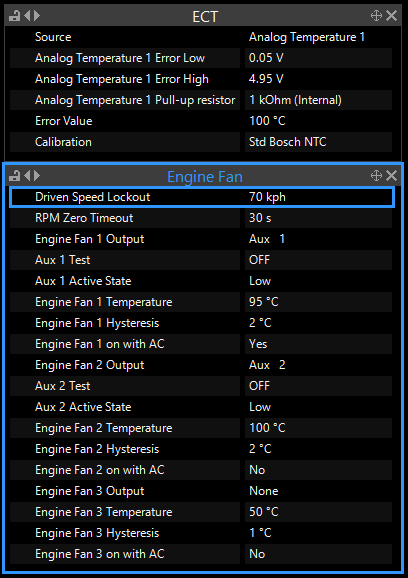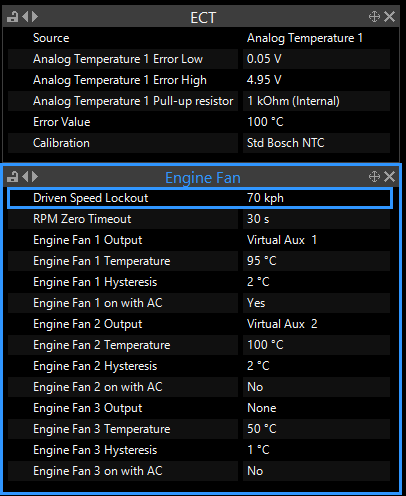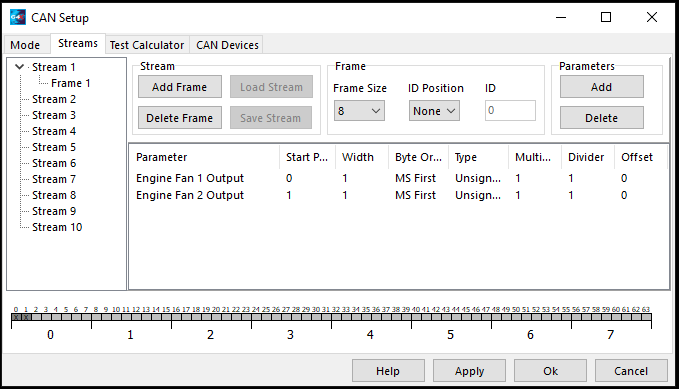The Engine Fan function has two purposes:
·Radiator fan control - an ECT sensor must be setup and working.
·Air conditioning (AC) condenser fan control - AC Clutch Control must be setup and working.
Engine Fan Settings
·Driven Speed Lockout - The Driven wheel speed above which engine fan and condenser fan operation will disable. This setting has a hysteresis of 5 kph. If set to 0.0 kph the lockout will be ignored. If set too low the engine could overheat.
·RPM Zero Timeout - The amount of time the Engine Fan will run for once the engine speed is zero. It is useful to set this timer so the system will continue cooling, but not flatten the vehicles battery. This timer is only active while the ECU has power, if the ignition key kills the engine and turns off power to the ECU then the timer will not run.
·Engine Fan X Output - The Auxiliary Output being used for this function, if the fans are being controlled over CAN set this to a virtual aux or an aux that isn't wired to anything.
·Engine Fan X Temperature - The temperature ECT must reach for Engine Fan X to turn ON.
·Engine Fan X Hysteresis - The number of degrees ECT must decrease below the Engine Fan X Temperature before the Engine Fan X will turn OFF. It is required to eliminate short fan cycles.
·Engine Fan X on with AC - If set to Yes Engine Fan X will turn ON one second after AC Clutch activates. The one second delay is to spread the increased engine load from the AC Clutch and condenser fan turning ON.
Warning
If the vehicle speed is at or above the Non Driven Speed Lockout and the Engine Fan Temperature is exceeded, the engine fan will NOT turn on. Incorrect Engine Fan setup could lead to engine damage.
If the engine coolant temperature is above the 'Engine Fan X Temperature' but the engine has not been run since the ECU turned on, the engine fans will not turn on.
Example - Auxiliary Output Setup
In this example the vehicle has an ECT sensor (An Temp channel) and two fans on the radiator/AC condenser (relays on Aux Output channels). The following settings are used:

Note that Engine Fan 3 is not used in the example. Below are some of the possible states of Engine Fan 1 (Aux 1) and Engine Fan 2 (Aux 2) at different operating conditions:
Notes |
ECT |
AC Clutch |
Engine Speed |
Driven Speed |
Engine Fan 1 |
Engine Fan 2 |
Before engine running |
15 °C |
Off |
0 RPM |
0 kph |
Off |
Off |
Engine warming up, engine running, vehicle speed increase |
92 °C |
Off |
>500 RPM |
60 kph |
Off |
Off |
AC clutch on |
92 °C |
On |
>500 RPM |
60 kph |
On |
Off |
Vehicle speed increase |
92 °C |
On |
>500 RPM |
80 kph |
Off |
Off |
ECT increase, vehicle speed decrease, AC clutch off |
94 °C |
Off |
>500 RPM |
60 kph |
Off |
Off |
ECT increase |
95 °C |
Off |
>500 RPM |
60 kph |
On |
Off |
ECT increase, AC clutch on |
99 °C |
On |
>500 RPM |
60 kph |
On |
Off |
AC clutch off |
99 °C |
Off |
>500 RPM |
60 kph |
On |
Off |
ECT increase |
100 °C |
Off |
>500 RPM |
60 kph |
On |
On |
Vehicle speed increase |
100 °C |
Off |
>500 RPM |
80 kph |
Off |
Off |
Vehicle speed decrease |
100 °C |
Off |
>500 RPM |
60 kph |
On |
On |
ECT decrease (hysteresis) |
99 °C |
Off |
>500 RPM |
60 kph |
On |
On |
ECT decrease (hysteresis) |
94 °C |
Off |
>500 RPM |
60 kph |
On |
Off |
Engine stopped (engine speed zero), ECT increase |
96 °C |
Off |
0 RPM |
0 kph |
On (for 30 s) |
Off |
Example - CAN Bus Setup
In this example the vehicle has an ECT sensor (An Temp channel) and two fans on the radiator/AC condenser (relays activated by controller on CAN bus). An output has to be set for the engine fan states to be calculated so when using the Engine FAN Statuses over CAN use a Virtual Aux or similar. The following settings are used:


Note that Engine Fan 3 is not used in the example. Below are some of the possible states of Engine Fan 1 (CAN) and Engine Fan 2 (CAN) at different operating conditions:
Notes |
ECT |
AC Clutch |
Engine Speed |
Driven Speed |
Engine Fan 1 |
Engine Fan 2 |
Before engine running |
15 °C |
Off |
0 RPM |
0 kph |
Off |
Off |
Engine warming up, engine running, vehicle speed increase |
92 °C |
Off |
>500 RPM |
60 kph |
Off |
Off |
AC clutch on |
92 °C |
On |
>500 RPM |
60 kph |
On |
Off |
Vehicle speed increase |
92 °C |
On |
>500 RPM |
80 kph |
Off |
Off |
ECT increase, vehicle speed decrease, AC clutch off |
94 °C |
Off |
>500 RPM |
60 kph |
Off |
Off |
ECT increase |
95 °C |
Off |
>500 RPM |
60 kph |
On |
Off |
ECT increase, AC clutch on |
99 °C |
On |
>500 RPM |
60 kph |
On |
Off |
AC clutch off |
99 °C |
Off |
>500 RPM |
60 kph |
On |
Off |
ECT increase |
100 °C |
Off |
>500 RPM |
60 kph |
On |
On |
Vehicle speed increase |
100 °C |
Off |
>500 RPM |
80 kph |
Off |
Off |
Vehicle speed decrease |
100 °C |
Off |
>500 RPM |
60 kph |
On |
On |
ECT decrease (hysteresis) |
99 °C |
Off |
>500 RPM |
60 kph |
On |
On |
ECT decrease (hysteresis) |
94 °C |
Off |
>500 RPM |
60 kph |
On |
Off |
Engine stopped (engine speed zero), ECT increase |
96 °C |
Off |
0 RPM |
0 kph |
On (for 30 s) |
Off |


